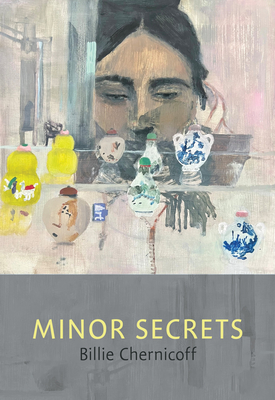Billie Chernicoff
Black Square Editions ($20)
by Joe Safdie
What does it take to write a great love poem?
We let each other be
or not, a little tea
slops over the rim
of your cup or mine
and the other
takes it personally.
We forget to kiss then kiss,
we marry for love,
agreeing to the sky also
These lines from Billie Chernicoff’s poem “As It Is in Heaven,” which is contained in her luminous new book Minor Secrets, start to give an answer: a total acceptance of otherness, the capacity to write in the first-person plural without any sort of appropriation, “Each of us the whole world, / naked and afraid” (“Next Morning in a Holy City”). Rather than provoking anxiety, however, this fear sometimes manifests as a charming awkwardness and incapacity: “I rove, arriving / at neither moon nor sonnet / nor any answer whatsoever” (“Letters from a Holy City”).
Chernicoff’s use of the almost archaic word “rove” suggests that she doesn’t ignore the playfulness of love either; it sometimes seems as if she’s engaging her readers in a game of language—“Bring me your ruse, a rose, / your news, / a more charismatic water”—which, if we don’t play along, can doom us to separation or isolation. But she welcomes us into the dance, giving us confidence we can participate: “I pray you too catch a wave.”
These are unabashedly lyric poems; indeed, they constitute new discoveries in that mode. The work of Charles Olson would seem to have little to do with lyric, yet Chernicoff, in a final section of the book called “Luminous Failures” that explores and distills some of her working principles, cites Olson as one of her poetic vectors: “I would place my work in the context of Olson’s compositional field, where I place myself out in the Open and breathe whatever comes into being.” Yet even in these reflections on her work, a playfulness is ever present: “I would like to confess poetry, though nothing I can confess or propose would be as true as a poem itself. And for sure a poem is a better liar.” On occasion, these poetics echo the effect of Chernicoff’s poems: “A good poem does not make you feel virtuous, it makes you feel terribly human—tender, doubtful, sometimes fearful and sometimes brave, sorrowful or mirthful, maybe prayerful, in love, full of longing, or just being—lost in the wild, an ecstatic nobody.”
Among their many virtues, Chernicoff’s poems never let us forget the joys and fascinations of living in the physical world:
Let me start again.
I want you the way the sea
wants herself, returns to herself
the way rivers find their way through marshes
the way one rows through marshes
and tires, and drifts, and dreams of the lover
while hours go by between her thighs
and books write themselves
That’s just one section from a longer poem called “Letters from a Holy City,” and it takes my breath away. What’s finally to say about this book, these poems? Perhaps these lines from “Next Morning”: “They lingered here as long as they could. / Now the whole world sways a little.”
Click here to purchase this book at your local independent bookstore:
Rain Taxi Online Edition Winter 2022-2023 | © Rain Taxi, Inc. 2023


